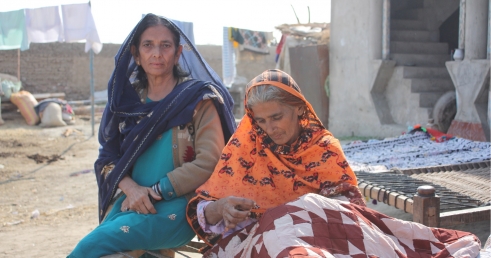
At this month’s World Humanitarian Summit, financing is high on the agenda for member states, UN agencies and NGOs alike. There is an increasing gap between the extent of humanitarian need in the world and the funding on offer to meet it.
The latest figures from the UN, for example, show that US$7.5 billion of funding requirements for UN-coordinated appeals (38% of the total) are not being met. This means a lot of very vulnerable people are not getting the basic assistance and protection they need to survive conflicts and disasters.
However, overall funding availability is not the only pressing issue. The commitments being proposed in the financing session at the summit highlight the need for increased funding that addresses the “differentiated needs of populations affected by humanitarian crises”. The way financing is allocated is also critical to ensuring the most vulnerable people receive the kind of protection and assistance they need.
Smarter funding
New research by HelpAge suggests that donors need to get much smarter with their funding to ensure it is used to reach the people who are in greatest need.
Each year since 2010, HelpAge International has analysed the funding that passes through the UN appeal process to gauge how far the needs of older people are being addressed in humanitarian programmes.
Our latest report, being launched today (17 May), provides a five-year overview of the evidence. It paints a bleak picture of a humanitarian system that is failing older people, who are among the most vulnerable in a crisis. The evidence tells us clearly that change is needed in the way humanitarian responses are designed, funded and delivered.
The report findings are the result of analysis of 16,221 projects proposed for funding from 2010 to 2014. We found that 855 (5.3%) of the projects proposed for funding included one or more activity intended to assist vulnerable groups including older people, and 439 of them were funded (2.7% of the total).
Furthermore, there were 154 (0.95% of the total) projects with activities targeting older people’s specific needs, and 74 (0.46%) were funded. This can leave us in no doubt that the response for older people is far from adequate. Such a response is not in accordance with humanitarian need and cannot be called impartial.
Download the report, End the neglect: a study of humanitarian financing for older people (2.6mb).
Fit for the future
This is the situation today and it will get even worse in the years to come if the system does not change. The world is ageing: in the next five years, adults aged 65 and over will outnumber children under five and by 2050, older people aged 65 and over will outnumber all children under 14.
People tend to assume only rich, developed countries are affected by such demographic change. In fact the number of older people in low and middle-income countries, where the human impact of disasters is usually greatest, is growing faster than in high-income countries. Population ageing means older people are set to be an increasingly significant part of the humanitarian ‘caseload’. The humanitarian system is not ready for this and must change if it is to be fit for the future.
Understanding the problem is the first step to finding a solution. This study contributes to a strong body of evidence of the neglect of older people in humanitarian responses – neglect that was clearly recognised in the synthesis of the extensive global consultations ahead of the World Humanitarian Summit. So what needs to change?
Whether the humanitarian system is broken or simply broke has been the subject of debate in the run-up to the summit. But one thing is clear: more money alone will not ensure impartial, needs-based responses for those who are at risk of being left behind in an emergency. Concrete changes are needed to the way humanitarian organisations and donors identify and respond to needs.
The recommendations of the UN Secretary-General’s High-Level Panel and the resulting ‘Grand Bargain’ provide useful proposals for how response can be refined and adapted, including greater investment in impartial joint needs assessments and the participation of affected people.
Commitment to inclusion
As our contribution to the summit and the post-summit process, HelpAge International has collaborated with other humanitarian organisations to go a step further. Organisations that, like HelpAge International, are specialist in particular vulnerabilities together with organisations with a more general humanitarian remit have identified the key actions that are necessary to ensure assistance is provided for all vulnerable groups, impartially and according to need.
In an Inclusion Charter we set out five key steps focusing on the participation of affected people in disaster response, the collection and use of data, funding, capacity development and the role of humanitarian coordination in supporting inclusive response.
We are calling on other organisations who are committed to impartial response for the most vulnerable to endorse the Inclusion Charter.
The summit in Istanbul offers the opportunity to lay the foundations for more effective humanitarian action – action that is inclusive and puts people, in all their diversity, at the centre. The practical, concrete reforms set out in the Inclusion Charter will be needed to achieve this. Smarter humanitarian financing is crucial to the success of this endeavour.
